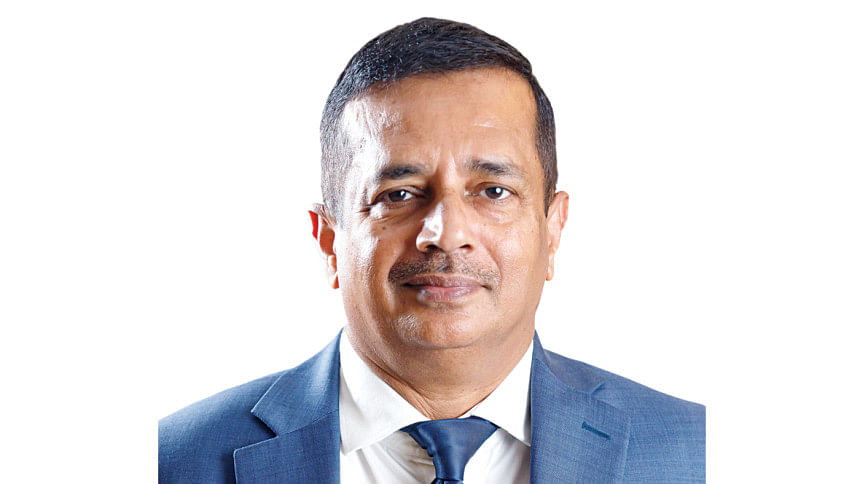Building MSME solutions around real entrepreneurial needs

Ahsan Zaman Chowdhury
Managing Director & CEO, Trust Bank
The Daily Star (TDS): How do you assess the current state of the MSME sector in Bangladesh, and what role do you think banks can play in accelerating its growth?
Ahsan Zaman Chowdhury (AZC): The MSME sector truly represents the backbone of our economy, contributing around 25% of our GDP and providing livelihoods to millions of Bangladeshis. When I travel across the country and meet these entrepreneurs, I see incredible determination and innovation—but also significant challenges. The biggest hurdle remains access to finance: many brilliant business ideas never take off simply because traditional banking requirements do not align with how MSMEs actually operate.
Banks like ours have a responsibility to bridge this gap. We need to move beyond conventional thinking and offer products that genuinely serve these businesses—collateral-free loans, flexible repayment schedules that align with seasonal cash flows, and simplified application processes. Digital tools are game-changers here, allowing us to assess creditworthiness through transaction patterns rather than the traditional methods of loan evaluation. When we work in partnership with policymakers and institutions such as Bangladesh Bank, we can build an ecosystem that truly nurtures MSME growth.
TDS: What are the major challenges MSMEs face in accessing finance, and how is your bank addressing these issues—especially for micro and cottage industries?
AZC: The challenges are deeply rooted in the way formal banking has traditionally operated. Most micro and cottage enterprises function informally, maintain minimal records, and lack the collateral that banks typically require. They are often run by individuals who understand their businesses inside out but may lack the financial literacy to navigate complex banking procedures.
At Trust Bank, we have completely reimagined our approach. Our 'Trust Ekota' uses group-based lending models where community trust forms the foundation for credit decisions. We have invested heavily in training our officers to better understand these businesses and to use alternative methods for assessing creditworthiness—such as mobile money transactions, supplier relationships, and community reputation, rather than solely relying on bank statements.
TDS: Does your bank have any dedicated products, financial literacy programmes, or credit guarantee schemes targeted at MSMEs? Please share key initiatives.
AZC: We have built our MSME portfolio around understanding real needs rather than forcing entrepreneurs into standard banking frameworks. 'Trust Ekota' focuses on micro-entrepreneurs who benefit from group support and shared responsibility. 'Trust Projukti' is designed for light engineering businesses requiring flexible terms tailored to their project cycles. 'Trust Uddoyog' helps start-ups launch with minimal barriers.
But products alone are not enough. Our financial literacy programmes help entrepreneurs gradually transition from informal to formal business practices. We work closely with local communities, conducting workshops in Bengali on practical topics such as record-keeping, tax compliance, and business planning.
TDS: How has your bank leveraged technology or digital banking solutions to improve outreach and services to MSMEs, particularly in semi-urban and rural areas?
AZC: Technology is transforming how we serve MSMEs, but we've learned that it must complement—not replace—human relationships. Our Trust Money App and Internet Banking enable entrepreneurs to transfer funds instantly, open Time Deposits, and manage DPS facilities without travelling to branches—crucial for businesses in remote areas where time away from operations means lost income, thus significantly reducing transaction costs.
What makes our approach unique is the combination of digital convenience and personal service. While clients handle routine transactions through the app, our relationship officers maintain close connections with entrepreneurs, understanding their evolving needs and providing guidance when challenges arise. We have significantly enhanced our digital KYC processes, making account opening much faster—especially important for women entrepreneurs who may face additional barriers in accessing branches.
Our officers conduct regular field visits to build trust within local communities and gain deeper insight into the unique challenges faced by rural entrepreneurs. This personal approach has proven particularly effective with first-time bank users who require reassurance alongside convenience.
TDS: What steps is your institution taking to support women-led MSMEs and promote financial inclusion among underrepresented segments?
AZC: Supporting women entrepreneurs is not just good business—it is essential for Bangladesh's economic future. 'Trust Sristi' removes traditional barriers with just a 500 taka opening deposit and includes free digital banking and insurance coverage. Most importantly, 'Trust Nondini' provides substantial unsecured loans of up to 25 lakh taka, specifically designed to accommodate widows and divorced women without requiring spousal guarantees—recognising that women's financial independence should not depend on male relatives. Our business advisory services are tailored to women-led enterprises, helping them navigate both financial and operational challenges.
TDS: Looking ahead, what policy reforms or collaborative efforts between banks and the government would you recommend to ensure sustainable development of Bangladesh's MSME ecosystem?
AZC: The path forward requires coordinated efforts from all stakeholders. We need expanded credit guarantee schemes to give banks the confidence to increase collateral-free lending. A centralised digital MSME registry, integrated with NID and tax systems as well as credit risk scoring, would revolutionise how we assess and serve these businesses.
Bangladesh Bank's refinancing programmes should be expanded with special provisions for women-led and rural MSMEs. The introduction of dedicated start-up refinance facilities would particularly benefit young entrepreneurs and innovative business models that traditional lending criteria might overlook. Equally important is the simplification of licensing and taxation procedures—many informal businesses want to formalise but find the process overwhelming.
Success depends on collaboration between banks, the government, NGOs, and fintech companies. Together, we can enhance financial literacy, improve market access, and ensure that technology serves inclusion rather than creating new barriers. The potential is enormous—we simply need the collective will to realise it.

 For all latest news, follow The Daily Star's Google News channel.
For all latest news, follow The Daily Star's Google News channel. 



Comments